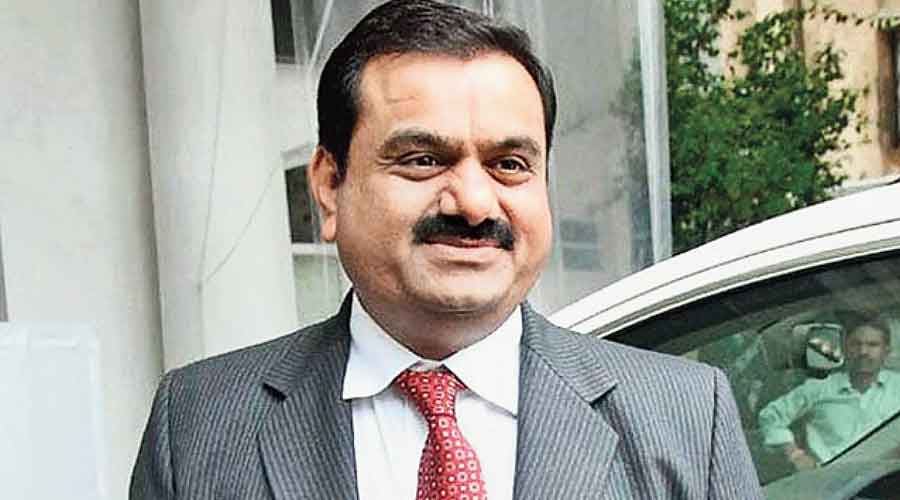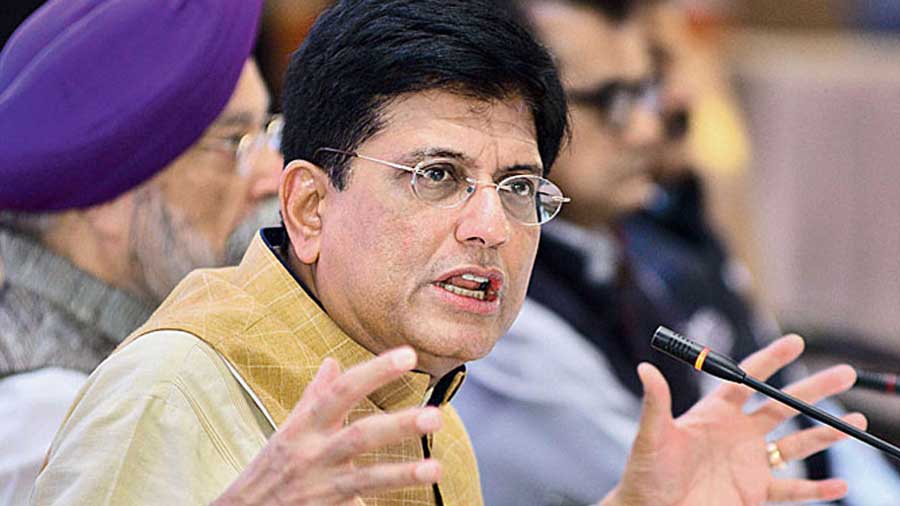The bluster bags in the Modi government have finally worked up the courage to speak on the Adani crisis — after being stunned into silence for close to a week during which stock and bond markets and corporate egos crumpled.
A day after finance secretary T.V. Somnathan dubbed the $108 billion valuation meltdown of the Adani group’s listed entities as a “storm in a teacup”, finance minister Nirmala Sitharaman and commerce minister Piyush Goyal waded into the debate for the first time.
Sitharaman’s spiel drew on the argument put forth by the top bureaucrat in her ministry that the Adani crisis paled into insignificance when viewed against the size and scale of the Indian macroeconomic fundamentals.
“Neither our macroeconomic fundamentals nor our economy’s image has been affected (by the Adani crisis),” Sitharaman told reporters after a conclave where she discussed aspects of her recent budget with various stakeholders.
The finance minister made a fumbled attempt to try and distance the government — and the economy — from the taint of the snowballing scandal.
The Modi government has been left red-faced after the Adani group had said in its 413-page rebuttal of the Hindenburg Research report that the attack on the country’s biggest tycoon was an assault on India’s image even as it desperately tried to drum up support from investors for the Rs 20,000 crore follow-on public offer (FPO) of Adani Enterprises.
The issue was eventually oversubscribed by 12 per cent last Tuesday and scrapped a day later in the heat of a market meltdown.
“Yes, FPOs come in and FIIs get out; these fluctuations are there in every market. But the fact that we had $8 billion coming in the last few days proves that the perception about India and its inherent strength is intact,” Sitharaman said. She said India’s financial regulators were independent and would look into the allegations against the Adani group.
She said capital market regulator Sebi had the ability to ensure stability in the markets. Meanwhile, the ministry of corporate affairs has started a preliminary review of the Adani group’s financial statements which are at the core of the controversy.
“The regulators will do their jobs.... The RBI has made a statement; prior to that, banks and LIC have themselves come out to state what their level of exposure (to the Adani group) is. So, the regulators will do their job and the regulators are independent of the government,” she said.
Commerce minister Goyal came up with a bizarre remark when he spoke about the Adani crisis.
“The share market’s valuation loss is not the loss of any individual or people’s wealth,” Goyal told reporters in Bangalore, clearly displaying a lack of sensitivity to the enormity of the Rs 7.5 lakh crore vaporisation of market capitalisation in Adani group stocks.
Admittedly, it was mere paper wealth: but the callous remark showed no concern for the investors’ horror in seeing that what had been dramatically built up in a space of 23 months from February 2020 incinerated in just five trading sessions.
“Investments in shares and stocks go up and down; that is a part of investment. But nowhere have the people of India lost the sums that are being mentioned ($100 billion). The financial institutions have clarified that their money is absolutely secure and safe,” the minister said, adding that both Life Insurance Corporation and State Bank of India had come out with the details.
The two state-owned institutions have made equity investments in the Adani group and also extended loans to the group. Goyal’s statement seemed to make no distinction between the two different kinds of exposure to the group.
The two entities have only certified that their loan portfolios are secure at the moment; like all other investors, they are losing money — even if notionally — on their shareholding.
“The regulators will take appropriate action to verify the truth of the allegations in the foreign agency’s report,” Goyal said. Meanwhile, the Securities and Exchange Board of India (Sebi) issued a statement on Saturday in which it said it was committed to ensuring the stability of the market.
“During the past week, unusual price movement in the stocks of a business conglomerate has been observed,” the capital market regulator said without naming the Adani group.
“As part of its mandate, Sebi seeks to maintain orderly and efficient functioning of the market and has put in place a set of well-defined, publicly available surveillance measures (including the additional surveillance measure or ASM framework) to address excessive volatility in specific stocks. This mechanism gets automatically triggered under certain conditions of price volatility in any stock,” it said.
The Opposition has been demanding a detailed investigation into the Hindenburg accusations. In its statement, Sebi appeared to waffle on whether it would actually do that. Here’s how it hemmed and hawed on the subject.
“Further, in all specific entity related matters, if any information comes to Sebi’s notice, then, as per extant policies, the same is examined and after due examination, appropriate action is taken. Sebi has consistently followed this approach on entity level issues and would continue to do so in future as well.”
It made no mention of the fact that it had received complaints about the Adani group a long time ago, including from Trinamul MP Mohua Mitra, which have all been encapsulated in the Hindenburg report.












